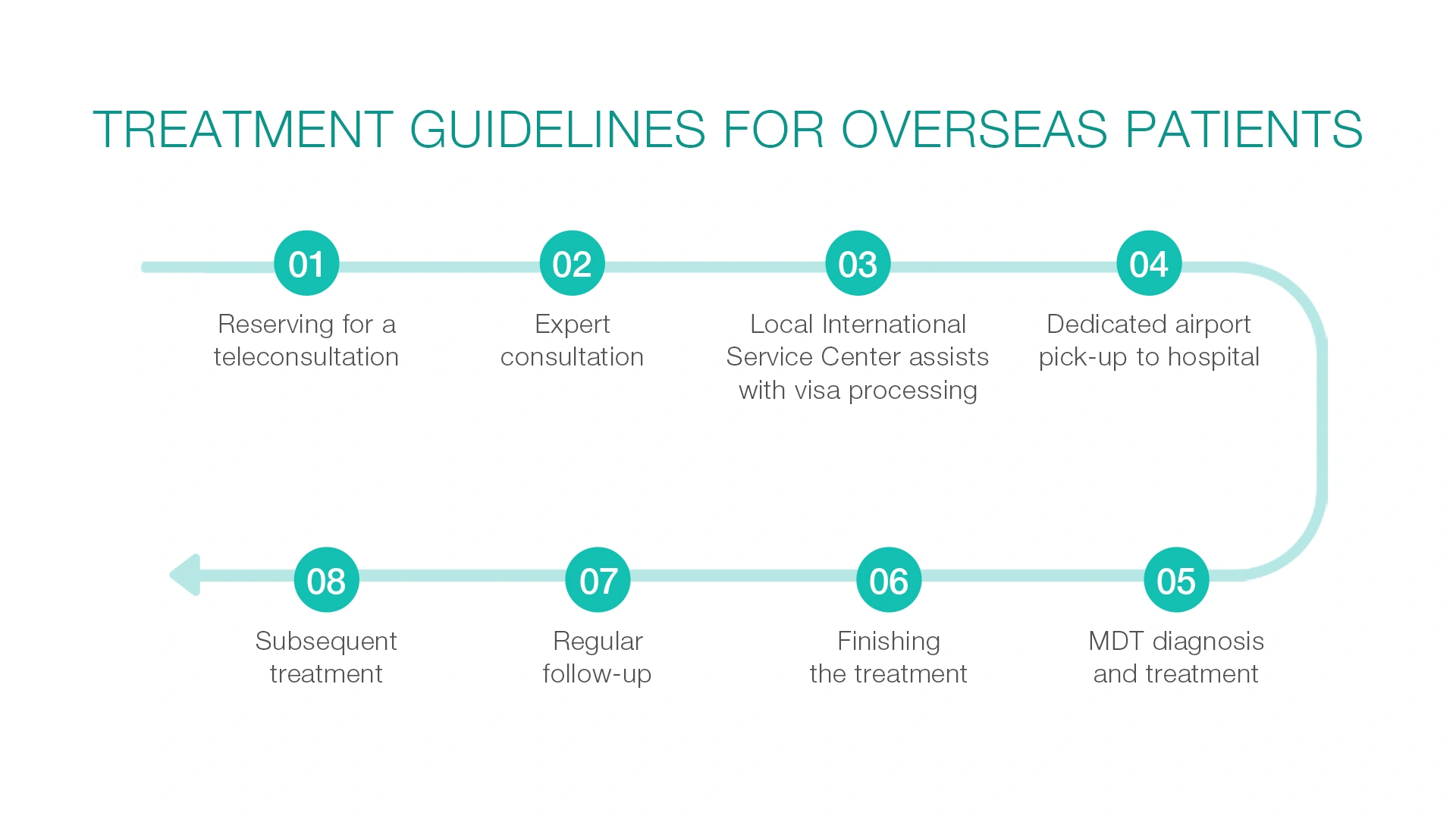Why Choose Minimally Invasive Treatment?
Surgery, radiotherapy, and chemotherapy are common treatments for ovarian cancer. While these traditional methods kill cancer cells, they may also damage healthy tissues and cause side effects. With advancements in medical technology, minimally invasive treatments have emerged as a new hope for ovarian cancer patients.
|
Surgery
|
Radiotherapy
|
Chemotherapy
|
| Side Effects |
Postoperative pain
|
Skin irritation (e.g., redness, dryness)
|
Nausea and vomiting |
| Risk of infection at the surgical site |
Fatigue
|
Loss of appetite |
| Bleeding or poor wound healing |
Nausea and vomiting |
Fatigue |
| Organ dysfunction (e.g., bladder/bowel) |
Diarrhea or bowel issues |
Hair loss |
| Loss of fertility (if ovaries/uterus removed) |
Long-term risks (e.g., secondary cancer) |
Immune suppression (higher infection risk) |
|
Reproductive system damage (infertility) |
Mouth ulcers |
|
|
Neuropathy |
Minimally invasive treatment is a therapeutic approach that achieves medical outcomes by minimizing physical trauma. It utilizes small incisions or natural body orifices, employing instruments such as endoscopes and catheters to perform surgical procedures or therapies, thereby reducing bodily damage. Ovarian cancer patients who demonstrate poor response to conventional treatments, are inoperable, or experience recurrence and metastasis may prioritize minimally invasive treatment as an option. Compared to traditional surgery, radiotherapy, and chemotherapy, minimally invasive treatment offers the following advantages:
|
Pros of Minimally Invasive Technology
|
Details
|
|
Less Trauma
|
Tiny incisions (a few millimeters) reduce tissue damage.
|
|
Less bleeding, reducing transfusion needs.
|
|
Faster Recovery
|
Shorter hospital stays and quicker return to daily activities.
|
|
Lower risk of postoperative complications.
|
|
Less Pain
|
Reduced need for painkillers
|
|
Fewer Complications
|
Lower infection risk.
|
|
Reduce intraperitoneal adhesions and reduce complications such as intestinal obstruction.
|
|
Better Aesthetics
|
The surgical scar is small and barely noticeable, making it suitable for patients with high aesthetic requirements.
|
|
Psychological Benefits
|
Less trauma and faster recovery ease mental stress.
|
Cases of Ovarian Cancer Patients in Our Hospital
Many ovarian cancer patients choose our hospital for minimally invasive comprehensive treatment. Our MDT will develop corresponding treatment plans based on the patient's personal physical condition. The following are several patients' sharing about their treatment process. After minimally invasive treatment, they were successfully discharged from the hospital and returned to normal life.
Ms. BEH--- Lost Her Left Ovary at 30, Minimally Invasive Treatment Preserved Her Fertility Hope
Ms. BEH is 30 years old and comes from Malaysia. In early January 2023, she frequently experienced abdominal bloating. After medical examination, she was diagnosed with ovarian cancer. For a woman just 30 years old, this sudden bad news was undoubtedly a heavy blow. However, holding onto the idea of receiving treatment as early as possible, Ms. BEH underwent surgery in Malaysia to remove her left fallopian tube and ovary, followed by six rounds of systemic chemotherapy. This left her with a 10cm surgical scar on her abdomen.In June 2024, the cancer recurred. She began experiencing bloody stools, and a colonoscopy revealed the cancer had spread to her rectum, forming a lesion about 8cm from the anus. Even her remaining right ovary showed cystic abnormalities. Local doctors told her the only option was to remove all her ovaries, meaning she would lose her fertility.
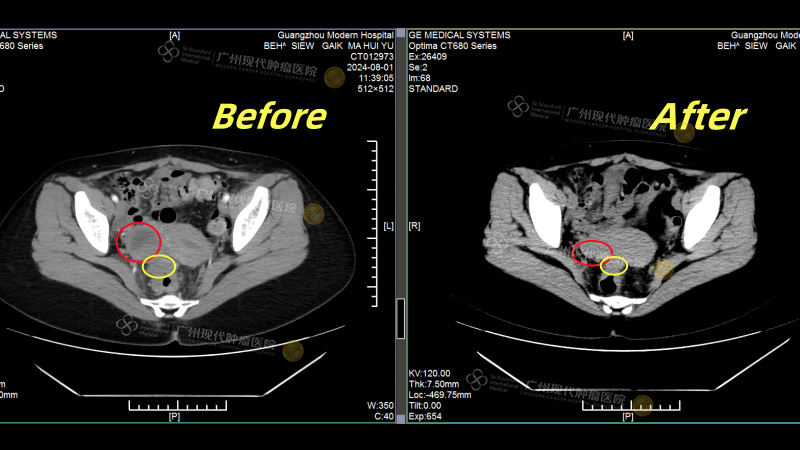
Later, her husband attended an anti-cancer sharing session hosted by Modern Cancer Hospital Guangzhou in Butterworth, Malaysia, where he learned about the hospital and its minimally invasive technologies. After consulting with Professor Song Shijun and the Malaysia International Service Center, Ms. BEH, accompanied by her mother, arrived at Modern Cancer Hospital Guangzhou on August 2, 2024.The hospital's MDT team quickly formulated a treatment plan: interventional therapy. After the second session of interventional therapy, a CT scan showed that the larger lesion in her right ovary and the cervical mass had significantly shrunk compared to when she was first admitted. Some smaller lesions, along with metastatic pelvic lymph nodes, had even disappeared! Thanks to this, she successfully preserved her remaining ovary.

Winda--- Interventional Therapy Helped Me Easily Pass the 6-Year Survival Mark and Successfully Give Birth
Winda, a stage IV ovarian cancer patient, had a tumor about 9cm in size discovered in her left ovary in June 2016. She underwent tumor removal surgery locally. However, in December 2016, she again experienced abdominal pain and physical discomfort. Tests showed a 1.4cm tumor in her pelvic lymph nodes. At this point, she fell into despair. On her uncle's recommendation, she came to Modern Cancer Hospital Guangzhou in January 2017. Upon admission, she was diagnosed with recurrent left ovarian cancer (Stage IV) with mediastinal lymph node metastasis and subclavian lymph node metastasis.
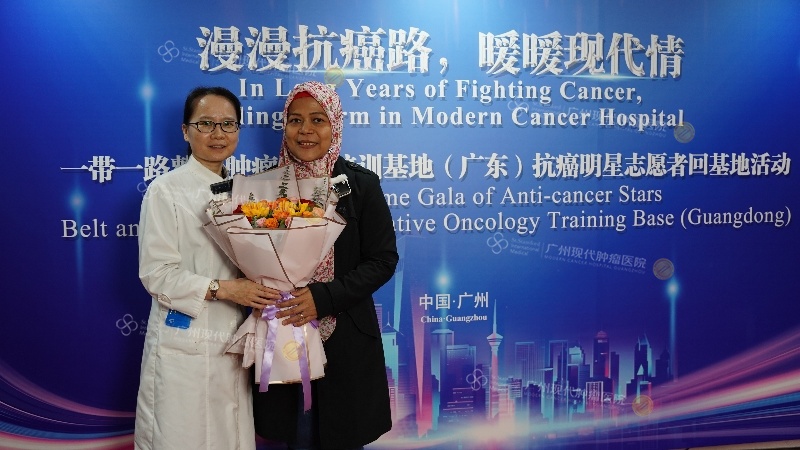
When Winda was first admitted, she was already very weak. The MDT team immediately discussed her case and formulated a treatment plan tailored to her condition: "minimally invasive interventional therapy + natural therapy"--- without removing her uterus and preserving her ovarian function. After three courses of interventional therapy, follow-up examinations showed the 1.4cm lymph node tumor in her pelvis had completely "disappeared." Initially, Winda had never dared to hope for motherhood. However, after following her doctors' advice--- maintaining good dietary and exercise habits and living positively--- luck finally came her way: she successfully gave birth to a healthy, adorable baby!

Nowiti---- Facing Both Breast Cancer and Ovarian Cancer Is Not Scary: Minimally Invasive Interventional Therapy "Eliminates Tumors in One Treatment"
Nowiti is now 57 years old. In 2007, she was diagnosed with breast cancer and underwent breast--- conserving surgery, axillary lymph node dissection, and multiple rounds of radiotherapy at a local hospital. In 2019, due to abnormal urination, she was diagnosed with ovarian cancer and underwent a total hysterectomy and bilateral oophorectomy at a local hospital. However, post-surgery, the cancer metastasized to multiple areas, forcing her to undergo six more rounds of chemotherapy. The repeated surgeries, radiotherapy, and chemotherapy sessions tortured Nowiti unbearably. Fortunately, until 2023, her results showed everything was normal. However, in August 2023, misfortune struck again: her cancer had locally recurred. A CT scan revealed a mass about 3×1.7cm near her left pelvis.
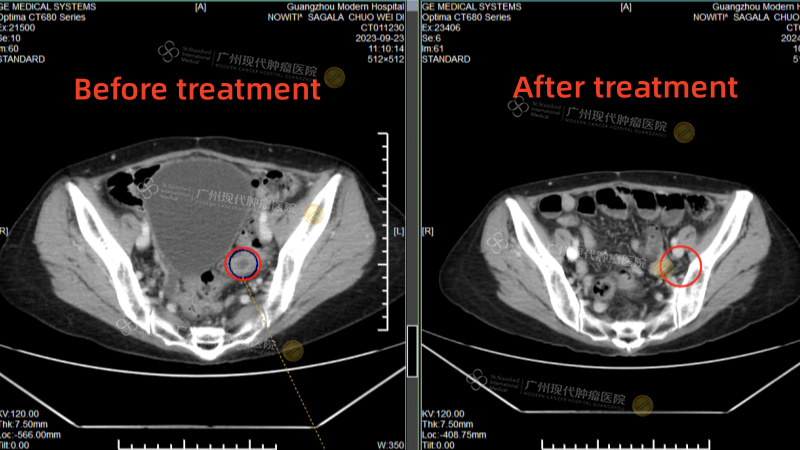
Unwilling to endure the ravages of radiotherapy and chemotherapy again, Nowiti chose to come to Modern Cancer Hospital Guangzhou for minimally invasive treatment on a friend's recommendation. Admission tests confirmed: recurrent ovarian cancer with a 3cm tumor and liver metastases.After just two sessions of minimally invasive interventional therapy, Nowiti reported that all her physical symptoms had disappeared. A CT scan showed remarkable treatment effects--- the tumor was almost invisible! On March 2, 2024, during a follow-up visit, her doctor informed her that her tumor markers had returned to normal and the cancerous lesions had completely disappeared!
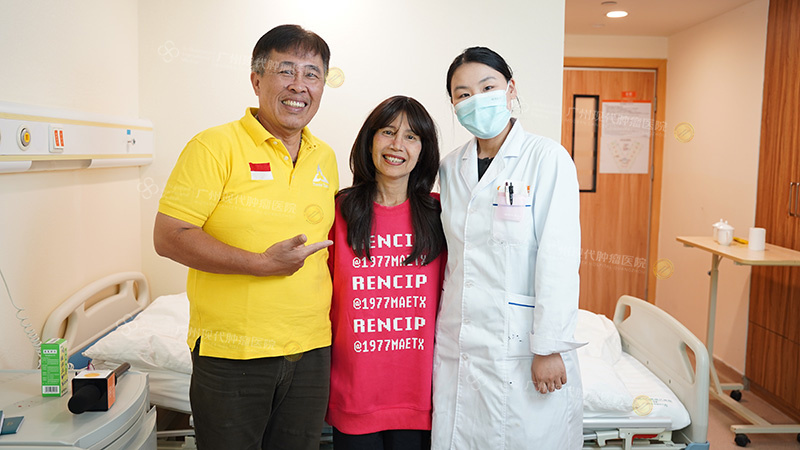
Expert Profile
Dr. Ma Xiaoying
▪ Director of Oncology Department
▪ Associate Chief Physician
▪ Member of Chinese Anti-Cancer Association
Educational Background:
2009 Master of Medicine Degree
2015 Exchange Study at National University Hospital, Singapore
2017 Advance study in Oncology Department of Sun Yat-sen University Cancer Center
2019 Advance study in Endoscopy Department of Sun Yat-sen University Cancer Center
Research Area:
Oncology
Specializations:
Minimally invasive targeted immunotherapy for,
▪ Gynecological cancer
▪ Breast cancer
▪ Gastrointestinal cancers
Dr. Ma has been engaged in clinical oncology practice for over 20 years, accumulating extensive clinical experience. She specializes in chemotherapy, endocrine therapy, molecular targeted therapy, immunotherapy for various malignant tumors including gastrointestinal tumors, breast cancer, lung cancer, gynecological tumors, and urogenital system tumors, as well as the treatment of advanced and refractory cancers. Proficient in minimally invasive treatments for various malignant tumors, she has particularly profound expertise in endoscopic diagnosis and treatment of tumors.


